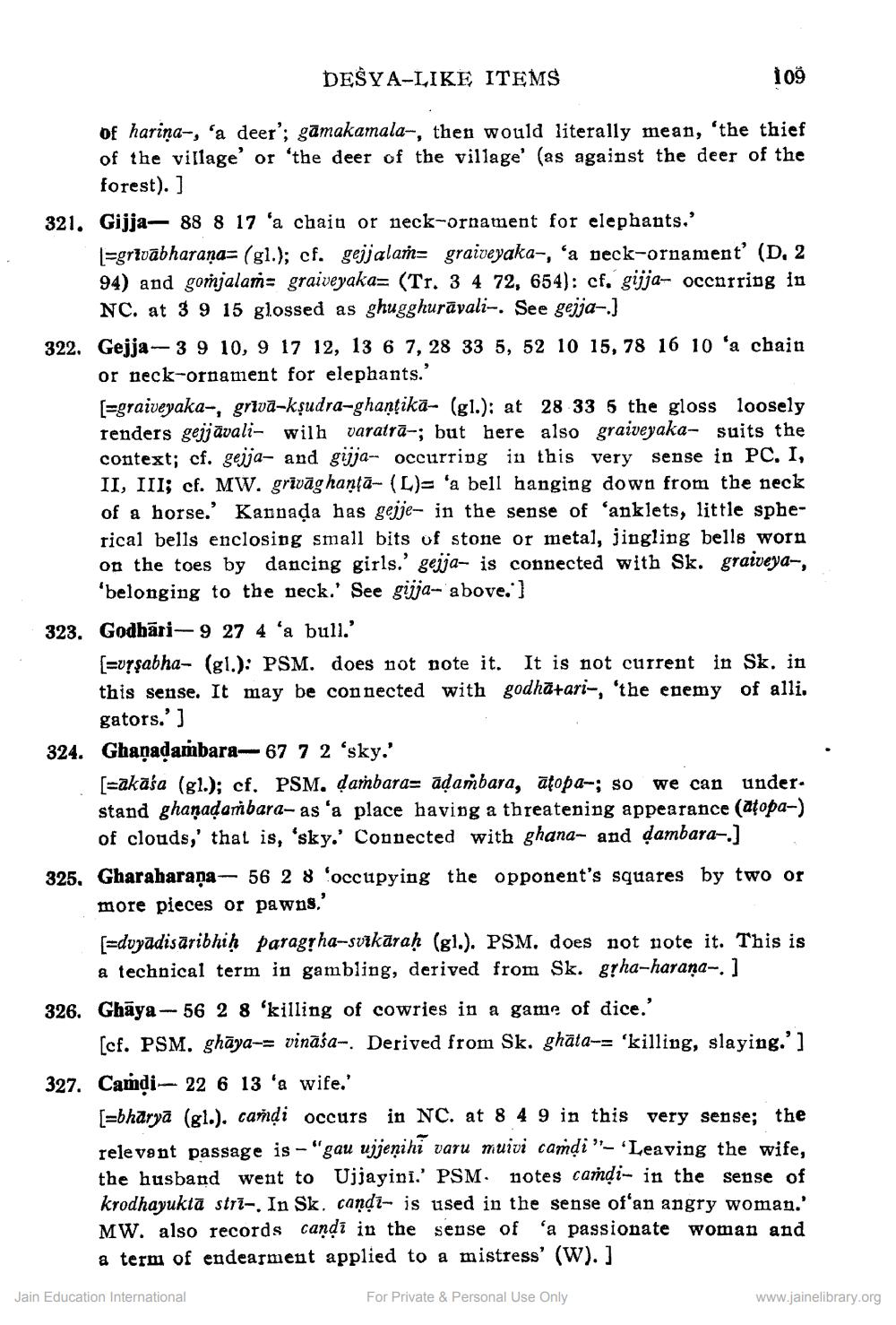________________
DESYA-LIKE ITEMS
109
of harina-, 'a deer'; gāmakamala-, then would literally mean, 'the thief of the village' or 'the deer of the village' (as against the deer of the
forest). ] 321. Gijja— 88 8 17 'a chain or neck-ornament for elephants.'
(=grivabharana= (gl.); cf. gejjalam= graiveyaka-, 'a veck-ornament (D, 2 94) and gomjalams graiveyaka= (Tr. 3 4 72, 654): cf. gijja- ocenrring in
NC. at 3 9 15 glossed as ghugghurāvali-. See gejja-.] 322. Gejja -- 3910, 9 17 12, 13 6 7, 28 33 5, 52 10 15, 78 16 10 'a chain
or neck-ornament for elephants.' (=graiveyaka-, griva-kşudra-ghanţikā- (gl.): at 28 33 6 the gloss loosely renders gejjavali, wilh varatrā-; but here also graiveyaka- suits the context; cf. gejja, and gijja- occurring in this very sense in PC, I, II, III; cf. MW. grīvāg hanţā- (L)= 'a bell hanging down from the neck of a horse.' Kannada has gejje, in the sense of anklets, little spherical bells enclosing small bits of stone or metal, jingling bells worn on the toes by dancing girls.' geija- is connected with Sk. graiveya-,
'belonging to the neck.' See gijja- above.:] 323. Godbāri-9 27 4 'a bull.'
[=vşşabha- (gl.): PSM. does not note it. It is not current in Sk. in this sense. It may be connected with godhatari-, 'the enemy of alli.
gators.'] 324. Ghanadambara- 67 7 2 'sky.'
[zakāśa (gl.); cf. PSM, darbara= adambara, atopa-; so we can under. stand ghanaderbara- as 'a place having a threatening appearance (atopa)
of clouds,' that is, 'sky.' Connected with ghana- and dambara-] 325, Gharabaraņa — 56 2 8 'occupying the opponent's squares by two or
more pieces or pawns. [=duyadisaribhih paragrha-svikārah (gl.). PSM. does not note it. This is
a technical term in gambling, derived from Sk. gyha-harana-. ] 326. Ghāya - 56 2 8 ‘killing of cowries in a game of dice.'
[cf. PSM. ghāya-= vināša-. Derived from Sk. ghāta-= 'killing, slaying.'] 327. Camdi- 22 6 13 'a wife.'
[=bharya (gl.). candi occurs in NC. at 8 4 9 in this very sense; the relevant passage is - "gau ujjenihi varu muivi camdi”- 'Leaving the wife, the husband went to Ujjayini.' PSM, notes candi- in the sense of krodhayukta stri-. In Sk, candi- is used in the sense of'an angry woman.' MW. also records candi in the sense of 'a passionate woman and a term of endearment applied to a mistress' (w). ]
Jain Education International
For Private & Personal Use Only
www.jainelibrary.org




